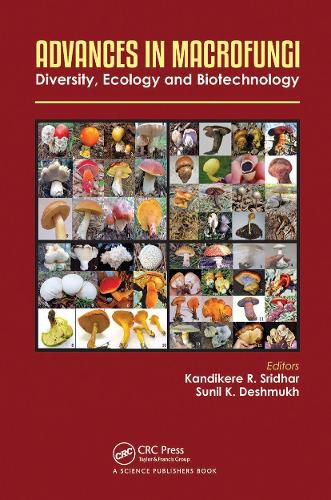Readings Newsletter
Become a Readings Member to make your shopping experience even easier.
Sign in or sign up for free!
You’re not far away from qualifying for FREE standard shipping within Australia
You’ve qualified for FREE standard shipping within Australia
The cart is loading…






Advances in Macrofungi: Diversity, Ecology and Biotechnology discusses the diversity and ecology of edible, toxic, medicinal and mycorrhizal macrofungi; the impact of ectomycorrhizal fungi in terrestrial ecosystems, ectomycorrhizal complex in Boreal forests and commercial application of Pseudotsuga in silviculture; the nutritional evaluation and cultivation of edible wild mushrooms; the diversity of novel metabolites of macrofungi useful in food, pharmaceutical and cosmeceutical industries; mushrooms as tool for eco-friendly synthesis of nanoparticles and proteomics of edible and medicinal mushrooms. In addition, it covers experimental designs, methodological approaches, biogeochemical cycles, conceptual/hypothetical models and life history strategies, linking mycorrhizal diversity to plant performance, chemotaxonomy, role of mycorrhizae in forestry and macrofungi in nanotechnology. It provides a valuable resource to graduate, post-graduate and researchers (in botany, microbiology, ecology, biotechnology, forestry, life sciences and environmental sciences) to understand the diversity, ecology, therapeutic value, mutualistic associations and biotechnological potential of macrofungi.
$9.00 standard shipping within Australia
FREE standard shipping within Australia for orders over $100.00
Express & International shipping calculated at checkout
Advances in Macrofungi: Diversity, Ecology and Biotechnology discusses the diversity and ecology of edible, toxic, medicinal and mycorrhizal macrofungi; the impact of ectomycorrhizal fungi in terrestrial ecosystems, ectomycorrhizal complex in Boreal forests and commercial application of Pseudotsuga in silviculture; the nutritional evaluation and cultivation of edible wild mushrooms; the diversity of novel metabolites of macrofungi useful in food, pharmaceutical and cosmeceutical industries; mushrooms as tool for eco-friendly synthesis of nanoparticles and proteomics of edible and medicinal mushrooms. In addition, it covers experimental designs, methodological approaches, biogeochemical cycles, conceptual/hypothetical models and life history strategies, linking mycorrhizal diversity to plant performance, chemotaxonomy, role of mycorrhizae in forestry and macrofungi in nanotechnology. It provides a valuable resource to graduate, post-graduate and researchers (in botany, microbiology, ecology, biotechnology, forestry, life sciences and environmental sciences) to understand the diversity, ecology, therapeutic value, mutualistic associations and biotechnological potential of macrofungi.